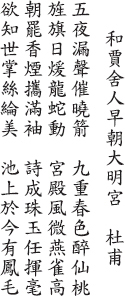180

Not long after Emperor Su-tsung’s return to Ch’ang-an in 757, Tu Fu (712–770) was reappointed censor but was demoted the next year. The water clock’s arrow indicated when it was time for court, and the sleeves of Chinese robes were like wings. “Gossamer” refers to the emperor’s silken and never-ending edicts. Tu Fu likens Chia Chih to Hsieh Chao-tsung (whose name meant “phoenix”), who also followed his father in composing imperial edicts, and of whom Emperor Wu (r. 502–549) of the Liang dynasty said, “You are so capable, you must have phoenix feathers.” The feather here is Chia Chih’s poem.
Responding to Secretary Chia Chih’s “Morning Court at Taming Palace”
TU FU
The sound of nightlong dripping speeds the shaft of dawn
spring within the inner gates intoxicates the peach trees
dragons writhe on tapestries in the warming sun
tiny birds soar above on the faintest breeze
incense spills from our sleeves after court
pearls pour from your brush into a poem
how do generations learn such gossamer art
by the pond today I found a phoenix feather